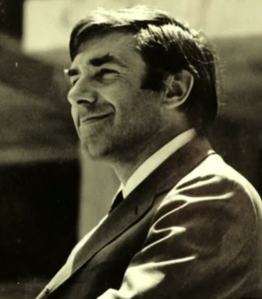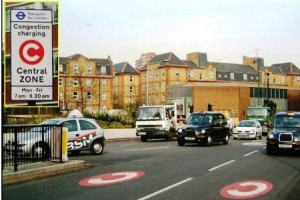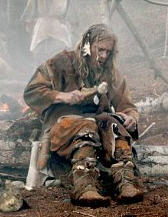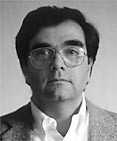 A collaborative network activity such as World Streets needs to find its own best combination of Sir Isaiah Berlin's variant on the Greek parable of the Hedgehog and the Fox ("the fox knows many things, but the hedgehog knows one big thing"). Given the huge information overload with which we live in this highly strung twenty-first century, it is absolutely critical that we play the hedgehog and stick rigorously to our topic. But... at the same time the many sided reality is that our topic by its very nature requires us also to be a fox. Thus are the contradictions and challenges of maturity.
A collaborative network activity such as World Streets needs to find its own best combination of Sir Isaiah Berlin's variant on the Greek parable of the Hedgehog and the Fox ("the fox knows many things, but the hedgehog knows one big thing"). Given the huge information overload with which we live in this highly strung twenty-first century, it is absolutely critical that we play the hedgehog and stick rigorously to our topic. But... at the same time the many sided reality is that our topic by its very nature requires us also to be a fox. Thus are the contradictions and challenges of maturity.
Friday, December 30, 2011
Krugman on Keynes: No time to duck
Man and car: Who is driving whom this morning?
What is it about what the English call a motor car that, when an otherwise perfectly decent human enters it and slams the door shut, somehow there is a  total transformation of that person gripping the stirring wheel into something, into someone who is just a little bit less decent and a little bit less human. A consistent theme of World Streets is that over the last hundred years or so our cars have not only transported us but they have also in the process also transformed us. Oops. And in the process they have fatally (I chose my word) altered the dimensions of the space in which we live our daily lives, and in the same process made this thing that was supposed simply to transport us from A to B at our leisure, into a defining part of our daily lives -- and indeed in some ways part of ourselves. A cruel critic might say, half Faust and half Frankenstein.
total transformation of that person gripping the stirring wheel into something, into someone who is just a little bit less decent and a little bit less human. A consistent theme of World Streets is that over the last hundred years or so our cars have not only transported us but they have also in the process also transformed us. Oops. And in the process they have fatally (I chose my word) altered the dimensions of the space in which we live our daily lives, and in the same process made this thing that was supposed simply to transport us from A to B at our leisure, into a defining part of our daily lives -- and indeed in some ways part of ourselves. A cruel critic might say, half Faust and half Frankenstein.
Tuesday, December 27, 2011
Parks in, Cars not out? Is that going to be our future?
 Michael Kimmelman reports in today's New York Times about the new trend whereby "All around the world, highways are being torn down and waterfronts reclaimed; decades of thinking about cars and cities reversed; new public spaces created." That is certainly good news and true, but there is a bit more to it than that as you will see if you read on.
Michael Kimmelman reports in today's New York Times about the new trend whereby "All around the world, highways are being torn down and waterfronts reclaimed; decades of thinking about cars and cities reversed; new public spaces created." That is certainly good news and true, but there is a bit more to it than that as you will see if you read on.
Saturday, December 24, 2011
Op-Ed: Do you know your ecological footprint?
 Toward the end of each year, I take a few minutes to run my personal Ecological Footprint scan to see if I can get a handle on how I am doing relative to myself, to others and to the planet. Seems like the least I can do, not less because it does oblige me to think about my life pattern and choices in the greater scheme of things. "Walk the talk", etc., etc. (PS. On a more global basis, to get a feel for where the high scores hang out, this map of earth lights at night will provide you with some good clues.)
Toward the end of each year, I take a few minutes to run my personal Ecological Footprint scan to see if I can get a handle on how I am doing relative to myself, to others and to the planet. Seems like the least I can do, not less because it does oblige me to think about my life pattern and choices in the greater scheme of things. "Walk the talk", etc., etc. (PS. On a more global basis, to get a feel for where the high scores hang out, this map of earth lights at night will provide you with some good clues.)
Friday, December 23, 2011
Defining principles: Remembering Mrs. Jacobs
 As we move ahead with the Safe Streets project over the course of the year ahead, there will be a small group of people to whom we shall be referring from time to time who have, through their insights and contributions, basically redefined the entire field of transport in cities. And Mrs. Jane Jacobs is of course one of this wonderful group. We are honored to be able to share these leadership profiles with you, and for Mrs. Jacobs we pass the word to Michael Mehaffy who reminds us of her contributions and takes on her critics head-on.
As we move ahead with the Safe Streets project over the course of the year ahead, there will be a small group of people to whom we shall be referring from time to time who have, through their insights and contributions, basically redefined the entire field of transport in cities. And Mrs. Jane Jacobs is of course one of this wonderful group. We are honored to be able to share these leadership profiles with you, and for Mrs. Jacobs we pass the word to Michael Mehaffy who reminds us of her contributions and takes on her critics head-on.
Wednesday, December 21, 2011
La femme est l'avenir de l'homme
The French poet Louis Aragon told us some two generations ago that "Woman is the future of man". And if we had any doubts about that as we enter into 2012, we have today before our eyes this exceptional, moving photograph of a street demonstration yesterday in which several thousand brave women marched through central Cairo in an extraordinary expression of anger over images of soldiers beating, stripping and kicking female demonstrators in Tahrir Square. --> Read on:
Tuesday, December 20, 2011
Safe Streets defining principles: Remembering Donald Appleyard
Safe Streets is a collaborative worldwide project which will aggressively  network over the whole of 2012 in our search for shaping ideas with some of the leading thinkers, groups and programs in the field , looking to the future but also not forgetting the past -- including drawing attention to the defining contributions of a certain number of leading thinkers. teachers, writers and sustainability activists, who are no longer with us but who through their work have laid down some of the most important principles which we now need to recall and take into account as we move to create a broad common framework for sustainable streets all over the world. For those of you who do not already know about the formidable vision and work of Donald Appleyard, we have pulled together a collection of reference points that should give you a good first introduction, and at the end of this piece some additional reference materials for those wishing to go further (as indeed you should).
network over the whole of 2012 in our search for shaping ideas with some of the leading thinkers, groups and programs in the field , looking to the future but also not forgetting the past -- including drawing attention to the defining contributions of a certain number of leading thinkers. teachers, writers and sustainability activists, who are no longer with us but who through their work have laid down some of the most important principles which we now need to recall and take into account as we move to create a broad common framework for sustainable streets all over the world. For those of you who do not already know about the formidable vision and work of Donald Appleyard, we have pulled together a collection of reference points that should give you a good first introduction, and at the end of this piece some additional reference materials for those wishing to go further (as indeed you should).
Monday, December 19, 2011
Whitelegg proposes radical overhaul and extension of congestion charge in London.
This report by Professor John Whitelegg scrutinizes the possibilities for developing the existing London congestion charge as a response to concerns about future  levels of congestion, air pollution and health and economic efficiency. These concerns are important policy considerations at any time but against a background of forecast increases in population and economic activity in the Greater London area they become more important still. World Streets is more than pleased to share this original work with our readers, not less because we take a strong stance against the introduction of technology-based road pricing in cities of the Global South, where it is our view here are more effective ways of achieving the goals of traffic reduction and much-needed new sources of income for public and non-motorised transport. Let's see what John has to say in this timely report from a London perspective.
levels of congestion, air pollution and health and economic efficiency. These concerns are important policy considerations at any time but against a background of forecast increases in population and economic activity in the Greater London area they become more important still. World Streets is more than pleased to share this original work with our readers, not less because we take a strong stance against the introduction of technology-based road pricing in cities of the Global South, where it is our view here are more effective ways of achieving the goals of traffic reduction and much-needed new sources of income for public and non-motorised transport. Let's see what John has to say in this timely report from a London perspective.
What happens in a high-tech Smart City when the lights go out?
 Wouldn't you say that is worth thinking about while you are figuring out how to spend the taxpayers money for safe streets?
Wouldn't you say that is worth thinking about while you are figuring out how to spend the taxpayers money for safe streets?
Thursday, December 15, 2011
Geetam Tiwari on Pro-Poor Green Urban Transport
In this ten minute video Professor Tiwari takes a useful step back from the usual pure transport and all too often dominant technology/infrastructure perspective, taking us back for starters to the fundamentals of what is going on at the level of city dynamics and the daily lives of the vast. of the neglected great majority of all who live and need to get around in the cities in her great and sprawling country. She comes down hard on past policies that have heavily favored the well to do, while all too systematically ignoring the daily needs of the rest. And that of course is unsustainable. Let's listen to what she has to say:
World City Modal Split Database: An invitation
 This open project from EPOMM -- the European Platform on Mobility Management -- is an absolutely brilliant idea. It does not require much explanation to get started; you can be off and going if you simply to click here and dig into their Google map. That said, a few words of introduction may not be altogether without their use to help you take full advantage of their good work.
This open project from EPOMM -- the European Platform on Mobility Management -- is an absolutely brilliant idea. It does not require much explanation to get started; you can be off and going if you simply to click here and dig into their Google map. That said, a few words of introduction may not be altogether without their use to help you take full advantage of their good work.
Wednesday, December 14, 2011
Report on 2011 Urban Mobility India Conference
 Report for India Streets by Vidyadhar Date, Mumbai
Report for India Streets by Vidyadhar Date, Mumbai
The fourth annual Urban Mobility India conference organised in Delhi from December 3 to 6 by the ministry of urban development was no doubt a useful exercise. It did well to give more focus on bicycles and public transport than the previous conference. But the venue itself was highly inaccessible, difficult to reach even by a private car, leave alone public transport. --> Read on:
Tuesday, December 13, 2011
Man – > Technology – > Speed – > Distance – > Destruction of proximity
This out of control bulimic spiral begins with man's uncontrollable tool-making itch, and from thence ,and unknown to us at the time, to tools which take on transforming lives of their own -- one of which in the  domain of mobility being ever-increasing speed, which in turn leads to ever-increasing distances, and which finally and in largely unnoticed fatal tandem destroys the reality and oh-so important qualities of proximity and community. That's the deal and facing all this is the challenge of this collaborative project for 2012. What we thought was merely more convenient transportation, has snuck up on us and turned into very inconvenient and altogether unanticipated transformation.
domain of mobility being ever-increasing speed, which in turn leads to ever-increasing distances, and which finally and in largely unnoticed fatal tandem destroys the reality and oh-so important qualities of proximity and community. That's the deal and facing all this is the challenge of this collaborative project for 2012. What we thought was merely more convenient transportation, has snuck up on us and turned into very inconvenient and altogether unanticipated transformation.
Saturday, December 10, 2011
Combating the Myth That Complete Streets Are Too Expensive
Tanya Snyder from Streetsblog DC takes a good look at this often-advanced view that, good as they may be for a wide range of reasons, the fact is that we just can't afford complete streets. One more great reason not to change, eh?
Friday, December 9, 2011
Safe Streets 2012 Challenge: Let's take a step back to get some context
 Joel Crawford of Carfree Cities writes:
Joel Crawford of Carfree Cities writes:
"Cities in the modern era have been overrun by cars and trucks. Streets have been stolen from human uses by invasive street users. Not only is this method unlikely to be sustained into the future, it also robs society of some of its most important public spaces. Carfree cities are a delightful solution to many different problems at once." With that, let's have a look at his short film that bangs these points home.
[vimeo http://www.vimeo.com/32922989 w=400&h=225]
Occupy All Streets: The Role of Carfree Cities in a More Sustainable World from J.H. Crawford on Vimeo.
Thursday, December 8, 2011
Safe Streets 2012 Challenge: Is there only one way to skin this cat?
[vimeo http://www.vimeo.com/32958521 w=400&h=225]
Traffic in Frenetic HCMC, Vietnam from Rob Whitworth on Vimeo.
Tuesday, December 6, 2011
The Safe Streets Challenge: 2012 - 2015
After considerable and at times quite contentious discussions over the last  months with colleagues around the world through various discussion fora, social media, programs, conferences and personal visits, we have decided to make one of the principal themes of our work here at World Streets for the coming year that of Safe Streets.
months with colleagues around the world through various discussion fora, social media, programs, conferences and personal visits, we have decided to make one of the principal themes of our work here at World Streets for the coming year that of Safe Streets.
Sunday, December 4, 2011
"I prefer corruption to pollution"
The full message from Todd Edelman -- as part of a discussion on the Sustran/Global South forum of attempts to limit parking in cities through regulation, which  sometimes achieve at least some of their objectives, and at other times risk to open up opportunities for favoritism and corruption --reads: "Briefly (and simplistically): I prefer corruption to pollution." Now I find this a terrific provocative thought and while I leave you to sort that one out for yourself, here's a bit of context on this important, powerful, unambiguous, but nonetheless largely ignored policy issue behind his contentious phrase.
sometimes achieve at least some of their objectives, and at other times risk to open up opportunities for favoritism and corruption --reads: "Briefly (and simplistically): I prefer corruption to pollution." Now I find this a terrific provocative thought and while I leave you to sort that one out for yourself, here's a bit of context on this important, powerful, unambiguous, but nonetheless largely ignored policy issue behind his contentious phrase.



